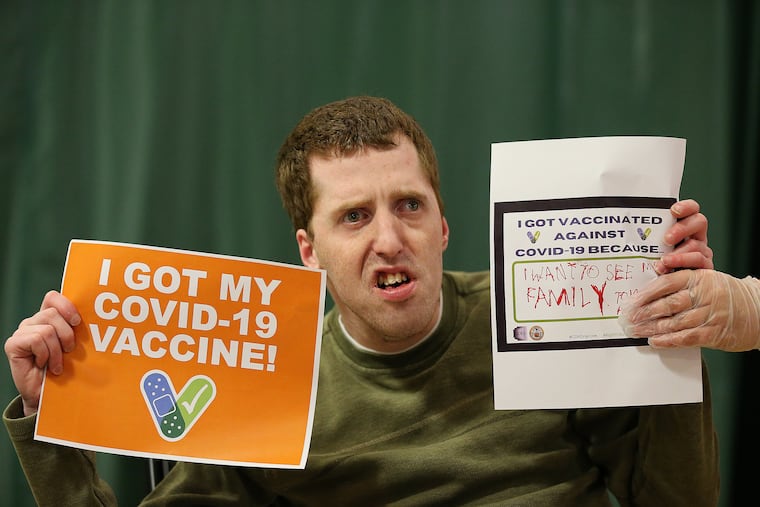COVID-19 vaccines starting to reach Philly area’s intellectually disabled community
Several studies have shown that intellectually and developmentally disabled individuals have higher odds of dying than the general public if they contract the virus.

The Communities of Don Guanella and Divine Providence had two choices for getting COVID-19 vaccinations to its employees and intellectually disabled clients.
The Delaware County nonprofit associated with the Roman Catholic Archdiocese of Philadelphia could wait for CVS to work its way through nursing homes first. Or it could apply to be a vaccinator itself, betting that it would get the vaccines sooner that way.
Don Guanella and Divine Providence, part of Catholic Social Services’ intellectual disabilities division, decided to get the vaccines directly, and it paid off. The organization received 1,000 Moderna doses last week and had administered all of them by Wednesday — more than a third of them to members of the surrounding community who were a top priority for the vaccine.
“We chose to go that way because it was the fastest way to get the vaccine here and administer it not only to ourselves but also to other people with special needs, and to first responders” in the community, said Angela Babcock, director of nursing at Don Guanella and Divine Providence, in Springfield, which provides residential and other services for about 330 people and employs about 800.
Babcock said the organization expected to receive an additional 2,000 doses this week.
Meanwhile, similar providers of intellectual disabilities services in Pennsylvania who chose to rely on CVS, one of the federal contractors administering the vaccine in long-term care facilities, first heard on Tuesday about when they would get their first vaccines. Elwyn, for example, is scheduled to receive its first vaccines on Monday, said Kurt Miceli, Elwyn’s chief medical officer.
In New Jersey, officials said Thursday that people with intellectual and developmental disabilities who live in group homes and other congregate settings are now eligible for the vaccine. Bancroft Neurohealth is also relying on CVS and has a plan in place to vaccinate a third to half of clients and staff by the end of this month. Bancroft employs 2,600 and serves more than 700 in residential programs.
Mark Davis, president of Pennsylvania Advocacy and Resources for Autism and Intellectual Disability, said vaccines have not been getting to workers and clients in the community he represents quickly enough. Studies have shown, he said, that people with intellectual and developmental disabilities rank very high for “adverse health outcomes, including death” from COVID-19.
A study published in October, analyzing data from California, Colorado, Indiana, Maryland, New Jersey, New York, Pennsylvania, and Virginia through May 31, found that 12.3% of adult COVID-19 patients with intellectual or developmental disabilities died from reasons related to the infection, while 6.7% of members of the general public who contracted the virus died.
In Pennsylvania, about 20,000 intellectually disabled people live in small group homes or institutions. About 40,000 live with their families or in their own residence, Davis said, but there’s no plan for those people. “That’s a problem for us, too,” Davis said.
Audrey Coccia, co-executive director of Vision for Equality, a Philadelphia nonprofit that supports disabled people and their families, said trying to get attention to the plight of families caring for intellectually disabled people at home has been like “trying to scale a wall.”
Caroline Johnson, Philadelphia’s deputy health commissioner, said the department has not received guidance on how to handle disabled people living at home.
“These priority groups are carved out based on what you do, where you live, what your underlying medical condition is, and the intellectual disabilities group doesn’t fit neatly into any one of them,” Johnson said. But, eventually, everyone will get the vaccine. “At some point, we’re going to rely on private physicians and providers in the community to recognize who is at greatest risk,” she said.
Like Don Guanella and Divine Providence, Melmark, in Berwyn, decided to self-administer the vaccine. CEO Rita Gardner feared that going the CVS route might mean waiting until March. CVS owns Aetna, which has a major presence in the Philadelphia region.
Melmark, which serves 290 children and adults, received 1,100 doses last Friday and started administering them Wednesday.
“Our priority was getting the vaccines as quickly as possible,” Gardner said. The need was particularly urgent for Melmark’s intermediate care facilities, “where our individuals are so medically fragile. That was a really critical piece for us,” Gardner said.